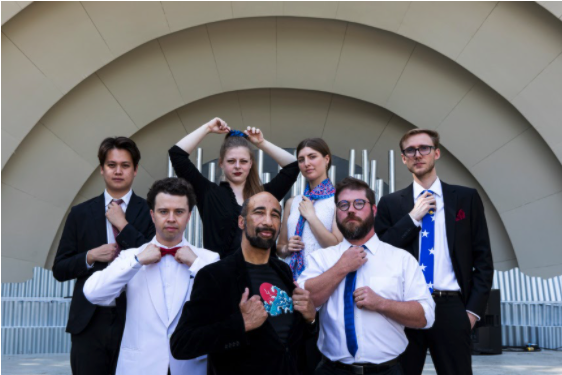Devin Patrick Hughes, music director & conductor
Father & Son: George Walker was a trailblazing and multitalented composer and pianist of the 20th Century. Among his many accomplishments, he was the first African American composer to win the Pulitzer Prize for music. He passed away in 2018, but his legacy continues in his son composer and performer Gregory T.S. Walker. As a performer, Gregory regularly tackles his father’s momentous works for violin, and the interview highlights interplay and the complex relationship between composer and performer, father and son.
Devin Patrick Hughes: I am here with Gregory T.S. Walker, part of a musical dynasty that started in 1922 with the birth of one of the great American composers, George Walker. Gregory, I’d love to just start by getting into the collaborations that you’ve done with your dad. You’ve done his sonatas for violin and piano, yourself as the violinist, him on the piano, and also more recently, you premiered his violin concerto with the Philadelphia Orchestra. Can you just talk about what it is like to collaborate on such a scale with your father?
Gregory T.S. Walker: Well, clearly an unforgettable, definitive experience for me. After surviving all the challenges associated with that, I feel as if I’m a different person than I was before. And after his passing, it’s something that I feel holds us together. I feel his presence now with the music that’s still in my life on a daily basis. We had our big premieres and concerts and recordings together over the past couple of decades. But even today, I’m still kind of working his music, the memory of it, into my daily routine. Every year, every season, I perform it someplace in the world. So it’s got to be ready to go. And that makes it feel as for me, I’m still with him.
Going back to the experience at the time, the main impression I was left with and I think a few musicians who have performed his music would be able to sympathize with this, is just the challenge, the overwhelming complexity one has to feel with it. We can think of it in terms of a collaboration because father son, why not, it appears plausible. But there are artists like my father who are rugged individualists, and the collaborative aspect probably was just limited to him listening to me play and realizing that he made mistakes with certain things. On the other hand, my father would routinely, and to the horror of his publisher, revise music long after it’d been released. But it was established pretty clearly early on that I would receive this. And my main contribution, my main achievement was to do whatever he asked. And there are some interviews where he alludes to that, and he seems to be grateful that I didn’t give him any flack. That didn’t matter how insane a passage was, that, unlike other players, you know, accomplished players, but they you know, wouldn’t it be easier if we do this, that as a dutiful son, I would just impale myself upon these difficulties.
So you can kind of imagine that it was a musical relationship that was exciting with something that was just a crucible for me to make it through, especially with some of the higher-profile venues we eventually reached, and some of the technical difficulties involved with his music and the interpretive insights that I keep searching for were plumbed at the time, some of them years after his death, I’m still trying to solve and I guess I wouldn’t really have it any other way because in that sense, he’s still alive for me.
I saw somewhere, that in terms of revisions, he purposefully did not share with you drafts or any early parts of the composition. So once you had it, it would be very clear that this was the final product, and nothing not was open to change. You probably know the relationship with Johannes Brahms and Joseph Joachim. Brahms would send all of his scores to also Clara Schumann and Joachim, especially the violin concerto, and, of course, Joachim and Clara and for instance Elisabeth Von Herzogenberg, they would come back with feedback and all these suggestions and Brahms would never accept any of it. So I’m curious, was there some give and take? I know your dad was old school, but most composers these days are working hand in hand with their soloist, for the most part. I’m thinking of Hilary Hahn and Jennifer Higdon, for example. Was there a back and forth?
Yes, there’s definitely a logic to that approach. You end up with a product that’s more idiomatic, it lies under the fingers more conveniently, and sometimes the composer’s learning something. An accomplished soloist should have some insights into the instrument of what makes it sing and what makes it more virtuosic that almost any non string player composer could benefit from. But, I guess we could politely say that dad was just a little more of a purist than that. He had an absolute vision and the vision was actually not something that was set in stone. So just when you think it’s tricky enough as it is to have a complex piece of music that was not written by a string player and that you have to negotiate, it’s like a Himalayan mountain that’s not really meant to be climbed. You have to find the route. And players like myself, would go through that process, including the falls, the metaphorical death and performance to be able to figure things out. But then I can think of a couple of examples of when, you know, a day or two before a big performance, you know, maybe in Philadelphia was just one example, he would decide that he wanted to change some notes. And one of the things that is fairly old school about his aesthetic, is just like he had seen growing up through the Golden Era, some people call it a classical music with some of the great virtuosos of the 1940s and 50s, how there was such an emphasis on the soloist that they all, just as a point of departure, would memorize and present everything as if they were the sovereign interpreter. So it was that, unlike you usually see in contemporary music, his preference for memorized performances was clear to those who are close enough to him. So, all to say that one’s getting ready for a premiere, one is just crunching numbers, trying to remember what’s going on with the Byzantine collection of notes, and then he decides within 24 hours to switch something right before that, and you don’t want to lose your grip on the mountain. So that was something that it was just a trip to just stay focused and survive some of these performances. Of course, in performance, you’re not wanting to give that impression. The idea is that somehow, and the obligation is even more pronounced with contemporary music: not only do you want to acquit yourself of the technical challenges, but you’re trying to communicate this music that might not even want to be communicated. And so there were some heights I felt I needed to scale that really, I think, not only left me as the artist I am today with things that I compose, things that I perform, but I think as Nietzsche would tell us, “just things that did not kill us made us stronger.”
Stravinsky was a kind of composer that did not want interpretation. He very clearly said “he wrote it. That’s how you play it.” And I know your dad, I’m sure he had some kind of relationship with Stravinsky at some point, was that his style or was he very much open to interpretation? Was he open to changes that may need to happen? I mean, obviously, he gave you changes 24 hours before the performance, but was he open to your changes?
No, it’s not a two way street. You hit the nail on the head. In the great spirit of Stravinsky, that kind of sentimental approach to interpretation, that subjectivity, was against his nature. You felt as if he had labored himself to come up with not only the ideal combination of notes for his own purposes, but one of the reasons why even music that he wrote that sounds lyrical, sounds mellow, doesn’t sound like a technical nightmare, is such a brain-full, it’s because rather than allowing the performer to interpret and to slow down and speed up to make something more expressive based on it’s their own spontaneous intuition, he made a point of mathematically notating what that interpretation would be, what those subtle changes of apparent tempo alterations would be. And if you look at that effect notated on paper, you see complexities and rhythms that you rarely see otherwise. So he wanted to take charge of that at a certain level.
At another level, he acknowledged that these flesh bound machines playing his music, had their limitations. They were bound to have some emotional response to his music and that he was just going to have to live with that. And I think that he also was resigned to my nature, that that’s an approach that’s difficult for me to turn off if I feel passionate about a piece of music. And so he just nodded in acceptance, we’ll say, with some of the performances I was involved with.
You’re a multifaceted instrumentalist and composer, your dad said, George Walker said, “Being black had hindered my career as a pianist, but it actually helped me as a composer”. Can you talk about what he means by that? And how did his relationship between the performer and the composer influence your relationship, becoming exactly that?
Historically, if you’re looking at his career and how he began, as a teenager with these aspirations to be a concert pianist, but through the 1930s, you had a situation that, especially in the classical music world, was going to be no more than that of a novelty, no matter how great, a novelty at best. At worst, there’s something that even in my formative years, I saw attitudes serious gatekeepers in the classical music industry would have towards Asian musicians. Nowadays we know Asian musicians are some of the most accomplished icons in our field. But in the 1960’s, a number of people would actually articulate the question, “Can a Chinese person really understand Mozart. How is that possible?” And it was a struggle. They didn’t see themselves as racist, but they were struggling because this is classical music, you know? It comes from a different part of the world. So if you’re winding back the clock decades before that, black people, who are actually not only the correct race, but they’re associated with a different kind of music, would really be a little implausible in the field.
So some of the reviews he got, some of the struggles people had promoting his career as a pianist, despite the fact he toured Europe twice and was a Curtis graduate, were things that wore on him. And he was definitely quick to notice when his talent wasn’t being appreciated, when he was being disrespected. It just wasn’t worth it for him to struggle through that.
Now, you would think as a composer, you’d run into the same kinds of obstacles. But since his composing career developed some years after he had just thrown in the towel with a full fledged concert piano career, by then we were kind of entering the sixties or seventies and there were in pockets, communities of black artists who were banding together and their collective novelty, I think, made them a little bit more marketable. One of the big breakthroughs in the seventies was this series of recordings by black composers from the Columbia label.
Later on, he would look back at this time and say, “I was lumped in with all these people. I’m actually an important American composer. Why should I be just categorized according to my skin color?” But at that time in the seventies, you were lucky to get any kind of recognition at all. And so I would say that when he was describing the situation of how racism hurt him as a pianist, it could have helped him as a composer, that’s a bit of what he was talking about in his case.
And can you talk about how in your career as a performer and a composer, how those two pieces interact with each other?
Well, if the question would be how my career as a performer and a composer interact with the whole racial climate, I think that the the simplest answer just has to do with how, even though in the beginning it felt like I was in the shadow of my father, but also to a certain extent, my mother was a prominent musician, pianist and researcher. In the end, it turned out to be a ride on their coattails. And so I’ve gotten opportunities just being associated with a prominent composer like my father. I’ve gotten opportunities to work with other composers and somehow contribute in a small way to the community of African-American women composers by way of my mother and her research and her championing of that population. Just between those two things, even before you try to triangulate what’s going on with my own creative activities, there is almost a career there because the opportunities that pop up in both the areas that my parents trailblazed.
Let’s move to some of your more recent works. Just a few pieces we’ve collaborated on inlcude uneasy sits the king, Dream Catcher, dream n the hood, Song of the Untouchable, and Glitch for cyber guitar and orchestra. That’s just a small but highly representative aspect of your work. Can you talk about how that differs or follows the trajectory of the musical legacy that you’re carrying on from your father, or rebels in some ways?
Well, clearly just the technique to compose music is something that was influenced by his output. I had to go to different universities and study with different teachers. But the fingerprints of certain aspects of his approach are there in ways that he would have recognized. And you also have to also combine that with the reality that because he had a very purist approach to music and it was something that he drew from old Masters who preceded him and wanted to preserve and explore in an unaltered way. What that means is, almost any of the music that you mention above was not going to sit well with them.
The most colorful instance of that was there was one time when he was a member of this illustrious American Academy of Arts and Letters, all the top composers, writers and artists you can think of, Pulitzer Prize winners, are all members of this august institution. Every year, this institution breaks off into committees and creates various competitions for exorbitant prize money pots and there was one year when I decided that I would submit some music to this competition and he was aware of what I was writing. I would always run it by him, even though usually it would be met by a certain cricket like silence. And it made its way through the various levels. And finally, the final committee was trying to figure out whether this was going to win the big Charles Ives scholarship, and ordinarily he would have been part of that committee, but when people realized that the applicant was his son, he was sent to another part of the building, and these men labored over this and finally decided to give me the prize. And when he reported to me, you could just hear how stunned he was. He just didn’t understand why I would get it.
Do you remember what the piece was?
Oh, yeah. Microphone for Amplified Orchestra. It was something that an orchestra in this area known as the Timberline Symphony.
Ah yes, I’ve heard great things about them.
And immediately after they did, the Colorado Symphony, did a suite from this ten movement work, and then the Detroit Symphony played some of it. And what I submitted was actually, because I think I needed all ten movements, some movements from Detroit, some movements from Colorado Symphony, and some movements from the Timberline Orchestra.
The other competitors were composers whose names you wouldn’t recognize who are submitting their own works performed by major symphonies. Also, I had a Violin Sonata that was part of that package. So it was something that was, you know, had strong experimental aspects, to be sure. Not quite as wild as some of the things you and I have done together. And nobody would take it personally in our family. I wasn’t traumatized by the fact that he really didn’t have any particular appreciation for what I was composing, because just as he was the man that you had to accept, if you’re going to work with him, almost any other prominent composer who’s alive today or in the latter part of the 20th century, post Stravinsky, had a lot of problems for him. They were very unsatisfying for him. So I was in good company.
Well, and that’s the great thing about symphonic music: there’s something for everybody.
Yeah. And, you know, I think some people would just assume if you’ve got a creative individual, a composer, a writer, that the wonderful thing about these people is that they can create, they can produce something out of nothing. I would argue, most of us folks who consider ourselves creative, are sculpting down from something that already exists virtually in our imagination. And I mentioned that now because in a sense that took that to a logical extreme. You cut away all these things. It’s all about what you don’t want: you cut away, cut away, cut away. And then what you have left is your art.
Your dad said composing came extremely easily to him. Is that your experience with your own music?
He was speaking out of two sides of his mouth, I would say, even from his own perspective. I’m sure in the very beginning he was surprised: I think many young artists are when they find themselves doing what their idols were doing. You grow up as a pianist and all of a sudden you realize, hey, I can write piano music, it sounds pretty good. So in that sense, it just flows and it’s a very pleasant surprise. But later on, I think he was just continuing to push himself and he labored. It was kind of a joyful labor.
He said extremely easily. He didn’t even say easily, extremely… That’s a lot of easy!
The only thing I’ll add is my father produced music for many years, a number of decades, and I believe his last orchestral work is a piece called Sinfonia no. 5. Believe it or not, there is a likelihood I’ll be going out to London and playing the BBC Proms with a performance of the Sinfonia no. 5, the British premiere. He wrote this just a couple of years before he died. And in writing this, we talked quite a bit and he expressed the struggle.
Certainly if there had been no struggle before then, there was a struggle now. And he was there, age 94, slaving over this and telling me he didn’t know how he’d written the other music that he composed. It was so complicated he didn’t know how he’d been able to keep track of that.
So composing came easily to him until he turned 90 and then it started to creep up on him a little bit.
Yeah, I would say, you know, the age is a factor, but also I think a lot of people are going to drive themselves crazy if they just keep doing the same thing they’ve done year after year until they’re 90. What’s just as likely to happen is that they’re going to try to find new ways, try to avoid repeating themselves, which I know was important to him. And when you add that into the mixture, things are a little slower. And I don’t know that I inherited much else of his talent, but I have inherited sensitivity to that, trying not to repeat oneself and how difficult that is. So to answer the other part of your old question there, it’s a struggle. Everything I do as an artist feels like a struggle. And maybe I’m not alone in having the moments of self-doubt where you just think, is this worth it? What positive outcome could there be from all of this effort, all these hours, days, weeks, months, years to create single pieces, single performances?
The one thing I have going for me though, I will say is that, you know, if I reach my darkest hour, I just think about we’re part of here, this is what the family is. This is what we do. And then it becomes really simple. When one sees one’s son at the very beginning of this path that you and I have spent some time with, you can’t help but just empathize with the excitement. You don’t have any of the worries. You don’t have to remember the mixed results of the past. And I join you, particularly when it comes to looking at Lightskin Legend, watching to see how that all unfolds for him.
Well, Gregory, it’s been an honor to speak with you, and I am looking forward to our next crazy idea, whatever it may be, and just keep experimenting and keep putting the good news out there.
Absolutely. With your support, I think I can pull it off
This interview was originally released on August 20, 2020, on the One Symphony with Devin Patrick Hughes Podcast.
Related Articles:













